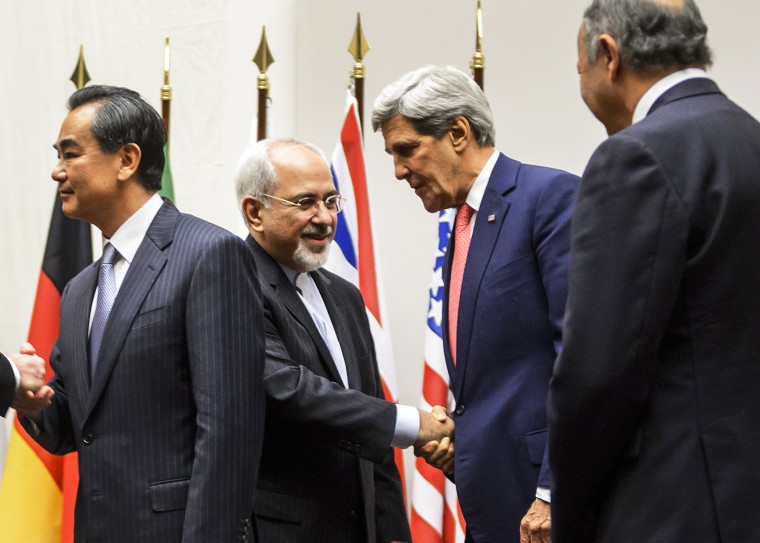Ten Senate Democrats who have advocated putting more sanctions on Iran gave the White House a two-month reprieve on Tuesday, saying they would wait until after the late-March deadline for completing the outlines of a deal to restrain Tehran's nuclear program before voting for a bill that President Obama has said would undermine any chance of reaching an agreement. The concession came in a letter to Mr. Obama from Senator Robert Menendez, the ranking Democrat on the Foreign Relations Committee, who has been increasingly at odds with the White House for his strong advocacy of a bill intended to squeeze Iran's oil revenues even harder if the nuclear negotiations do not result in an agreement. But Mr. Menendez's letter made clear that he and the other Democrats would join Senate Republicans if a meaningful accord was not reached by March 24.
White House gets some breathing room for diplomacy
Obama wanted more time for his international talks with Iran. As of yesterday, he's got it.

Opponents of international nuclear talks with Iran had a plan, and on the surface, it stood a decent chance at success. Congress would, under the strategy, approve new sanctions on Tehran, forcing Iranian officials from the negotiating table, and sabotaging the diplomacy.
The Republican-run House would approve the sanctions easily, as would the Republican-led Senate, and to help seal the deal, House Speaker John Boehner (R) ignored American protocol and invited Israeli Prime Minister Benjamin Netanyahu to deliver remarks to Congress -- two weeks before his own re-election bid -- in order to bolster support for the entire scheme.
For a while, it looked like there was only one question to answer: would Congress be able to override President Obama's inevitable veto? All of this was poised to come to a head within the next week or two.
At least, that was the plan. Yesterday, conditions changed.
The problem all along with the pro-sabotage contingent is that there's a simple question it could not answer: what's the rush? Those pushing for increased sanctions have argued for months that if the international diplomacy fails, Congress should be ready to punish Iran.
But why not actually wait for the talks to collapse? Why force them to collapse artificially while negotiations are ongoing?
What the White House wanted was more time. It also hopes to create conditions in which Iran, not the U.S., will be blamed if diplomacy ends up failing. For now, President Obama and his team have what they're looking for.
The fact remains, of course, that the extra time may not produce a result -- U.S. negotiations with our allies and Iran continue, but by all accounts, they're not exactly nearing an agreement -- and it's likely that the Obama administration will ask Congress to wait until the summer before approving new sanctions.
In other words, these Senate Democrats who are willing to give the talks more time will probably face a similar challenge two months from now, pondering whether to derail the diplomacy on purpose in March instead of now.
But it's also possible Secretary of State John Kerry and his team will inject a new round of urgency to the international talks, explaining, "We've got Congress breathing down our necks here, so let's get some work done."
As for Netanyahu, his controversial partnership with congressional Republicans has not gone according to plan -- it arguably backfired -- and the entire mess has strengthened the prime minister's critics in Israel.
Jeffrey Goldberg, meanwhile, labeled Netanyahu's recent moves a "disaster," undermining Israel's relationship with the United States, and alienating potential American allies. Goldberg added that Netanyahu's actions "suggest that he doesn't quite know what he's doing."